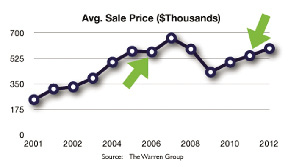"We're aggressively buying buildings right now," said a Back Bay multifamily investor. "We need to keep stealing everything we can before sellers realize what's going on."
The prevailing sentiment in the multifamily investment market is that many sellers still believe the market suffers from 2009 pricing. They fear making a sacrifice on price and getting less than peak values, particularly in an economy where many 401k's suffered massive depreciation and owners are coming out of retirement to go back to work.
Multifamily sale price data collected from The Warren Group shows that 5+ unit Massachusetts multifamily market values for 2011 are on-par with pre-recession pricing from 2006.
Interestingly, The Warren Group data shows that 2011 might just be the best time to consider selling since before Lehman went bust. Consistently falling 12 month rolling CAP rates since Q2 2010 further substantiate the Warren Group data, indicating that values may well be edging north even more as 2011 comes to a close.
Many bay state and northeast multifamily owners are gleeful when they talk about the future. Projections for the next four years herald dropping vacancy rates and increasing rents. Combine these statistics with pent-up renter demand among the 75 million-strong Generation Y demographic and the steady number of births following the Echo Boomers, and its easy to see why many owners are smiling.
Despite all the excitement, owners should be cautious. The stop/start atmosphere of today's economy doesn't provide a solid foundation for a robust recovery. After strong growth last year, 2011 has experienced an unemployment spike in May and still lagging consumer confidence. The nation's GDP, which in historical recoveries hovers around 4 to 5%, is growing just under 2.5%. With a doubling of GDP growth highly unlikely, the recovery will be subdued and likely characterized by a series of alternating strong and weak quarters.
Low wage growth has also been challenging. During the last two decades, average national rents have doubled along with gas and food prices. But average American incomes have barely moved, from $29,000 to $33,000. Wage pressure and increasing rents are bringing the market almost to the point where it's cheaper to own than rent. The higher rents go, the faster the multifamily market will peak.
Owners should also keep their eyes fixed on Washington, D.C. The horizon is still uncertain as talks of higher taxes, slashing the mortgage interest deduction, and higher interest rates loom on Capitol Hill. All projections aside, such legislation could threaten the upward trend in multifamily values and significantly erode the emboldened cash flows anticipated by apartment owners.
Zeb Couch is director of multifamily investments at Mansard Commercial Properties, Lexington, Mass.
Tags:









